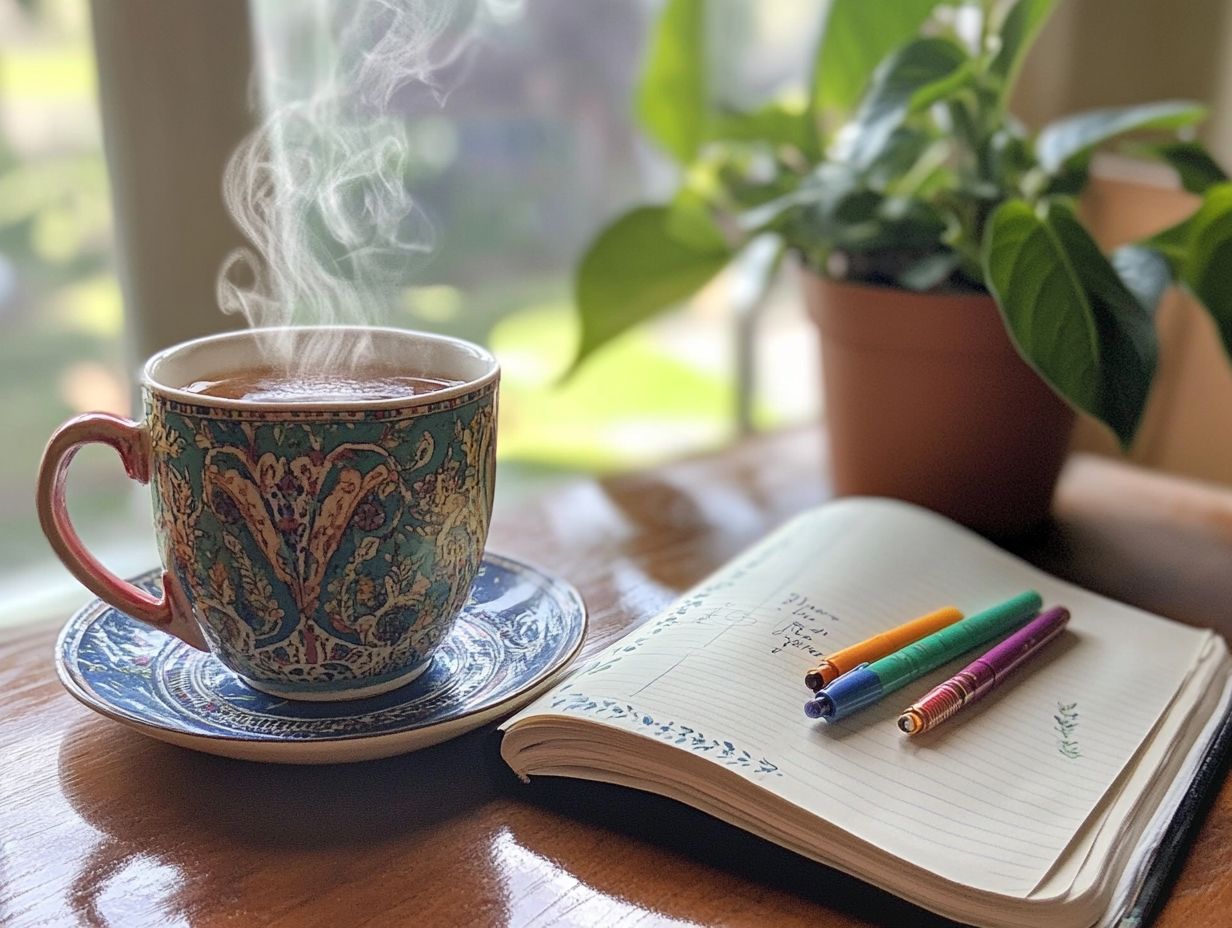Journaling is more than just a simple pastime; it’s a powerful tool for enhancing mental health and self-esteem.
Putting pen to paper can alleviate stress and foster emotional well-being.
Various journaling techniques promote self-reflection and personal growth, highlighting their transformative effects on beauty and self-confidence.
Practical tips for establishing a rewarding journaling practice make it a fulfilling part of your daily routine.
Discover the art of journaling and unlock its many benefits for your mind and spirit!
Key Takeaways:

The Connection Between Journaling and Mental Health
Journaling is a valuable tool for enhancing mental health, incorporating techniques such as expressive writing and therapeutic practices that promote emotional regulation, self-compassion, and stress management.
By engaging in daily journaling, individuals can cultivate self-awareness, process their emotions, and develop essential coping mechanisms for mental well-being. This practice not only facilitates trauma healing but also encourages personal growth and mindfulness, making it a crucial resource for those aiming to improve their emotional health and effectively navigate life’s challenges.
How Journaling Can Benefit Mental Health
Journaling provides a multitude of benefits for mental health, including improved emotional insight, enhanced emotional processing, and the development of effective coping mechanisms that give the power to individuals in their daily lives. This practice can function as a sanctuary for thoughts and feelings, offering a safe space for exploration and understanding.
For example, when facing anxiety, writing about specific triggers can aid in the identification of patterns and responses, ultimately leading to better management of these emotions. Techniques such as gratitude journaling, where individuals note three things they appreciate each day, can foster positivity and help shift focus from distressing thoughts.
Utilizing prompts like “Describe a moment today that made you smile” encourages reflection and awareness, while goal-setting pages facilitate personal growth and clarity regarding aspirations. Regular engagement with these methods can significantly enhance emotional regulation and resilience.
Types of Journaling for Mental Health

Various forms of journaling specifically address mental health, including therapeutic writing, gratitude journaling, and expressive writing, each serving distinct purposes in promoting emotional well-being.
Engaging in therapeutic writing allows individuals to explore their thoughts and feelings within a structured environment, thereby creating a safe space for self-reflection. Conversely, gratitude journaling encourages individuals to shift their focus toward positivity, cultivating a mindset of appreciation that can significantly enhance mood over time. Expressive writing facilitates emotional release, aiding individuals in processing traumatic experiences and alleviating feelings of anxiety.
To support these practices, several journaling applications provide customizable templates and reminders, thereby promoting consistency. This flexibility enables users to tailor their journaling experience to meet personal preferences and needs. Such personalization is essential, as it fosters a deeper connection with the journaling process and encourages long-term dedication to mental health improvement.
The Impact of Journaling on Beauty
The practice of journaling can have a significant influence on beauty, extending beyond physical appearance to include enhancements in self-confidence, promotion of self-reflection, and encouragement of self-care. These elements collectively contribute to a comprehensive understanding of beauty.
How Journaling Can Improve Self-Confidence
Engaging in journaling can significantly enhance self-confidence by fostering emotional insight and encouraging self-reflection, both of which are essential for personal growth and self-acceptance.
Through the practice of writing, individuals can effectively track their achievements, regardless of size, creating a tangible record that serves as a reminder of their abilities and resilience. Techniques such as gratitude journaling assist individuals in focusing on positive experiences, thereby facilitating a shift in mindset from self-doubt to appreciation for their efforts.
Confronting insecurities through prompts that encourage honesty can yield breakthroughs, transforming negative self-talk into constructive dialogue. Documenting personal growth milestones further give the power tos individuals by illustrating their journey, reinforcing the understanding that they possess capability and resilience, ultimately nurturing a more confident self-image.
Journaling for Self-Reflection and Self-Care

Journaling serves as an essential tool for self-reflection and self-care, allowing individuals to explore their thoughts and emotions, which in turn enhances emotional well-being and fosters the development of effective coping mechanisms.
This practice facilitates a meaningful dialogue with oneself, promoting deeper insights into personal motivations and challenges. By dedicating just a few minutes each day to the blank pages of a journal, individuals can identify patterns in their emotions and behaviors, thereby facilitating personal growth and healing.
To integrate journaling seamlessly into daily self-care routines, it is advisable to allocate a specific time, such as early in the morning or just before bedtime, for this reflective activity. Utilizing prompts or themes for each journaling session can provide structure to the reflection process, ultimately transforming journaling into a rewarding habit that nurtures mental clarity and emotional resilience.
Tips for Starting a Journaling Practice
Initiating a journaling practice can be transformative for personal growth and mental well-being. However, it is crucial to understand how to establish a consistent practice, select appropriate journaling applications, and apply effective writing techniques to achieve long-term success.
Choosing the Right Journal and Supplies
Selecting the appropriate journal and writing supplies is a critical initial step in establishing a successful journaling practice, as the tools utilized can significantly impact the writing experience and overall motivation.
When choosing journals, it is essential to consider factors such as size, paper quality, and binding type. These elements not only influence how the journal feels in hand but also affect the fluidity with which thoughts are transcribed onto the pages. Similarly, writing instruments, including pens and markers, can enhance the creative process by facilitating smooth transitions and promoting vivid expressions.
The emergence of journaling applications has introduced a digital aspect, offering convenient features such as prompts and reminders that can greatly enhance commitment to the practice.
Additionally, exploring various writing techniques, such as free writing or bullet journaling, can further personalize the experience, rendering it more engaging and ultimately leading to deeper reflections.
Establishing a Routine and Overcoming Writer’s Block

Establishing a routine for journaling and developing strategies to overcome writer’s block are fundamental for maintaining a regular practice that promotes emotional insight and personal growth.
Creating a consistent journaling schedule can be achieved by allocating a few minutes each day, such as during morning coffee or before bedtime, thereby ensuring it becomes an integral part of daily life. Additionally, incorporating healthy habits like mindfulness meditation can enhance focus and clarity, facilitating more thoughtful reflections.
When encountering writer’s block, employing techniques such as free writing or utilizing prompts can encourage creativity to flow without the constraints of perfection. Engaging in this process regularly fosters resilience and reinforces the notion that journaling is not merely a task but a nurturing activity that contributes to an overall sense of well-being.
Incorporating Journaling into Your Daily Life
Incorporating journaling into daily routines can be a highly beneficial practice that enhances mindfulness and promotes creative expression. Additionally, it fosters healthy habits that contribute significantly to overall mental well-being.
Ways to Make Journaling a Habit
Establishing journaling as a habitual practice requires the formulation of a routine that is compatible with one’s lifestyle, ensuring that it seamlessly integrates into daily life and facilitates emotional processing.
To achieve this, it is crucial to allocate a specific time each day for journaling, whether in the morning to reflect on goals or in the evening to unwind and evaluate the day’s events. This consistency cultivates a sense of commitment and allows for deeper emotional exploration. For more insights, check out this article on Journaling for Mental Health and Beauty.
Additionally, creating a comfortable environment furnished with preferred writing materials enhances the overall experience, making it more inviting. Over time, individuals may observe that this practice not only improves their self-awareness but also serves as a valuable outlet for stress management and clarity of thought, thereby enriching their overall well-being.
Creative Ideas for Journaling Prompts
Exploring innovative ideas for journaling prompts can significantly enhance the journaling experience and deepen emotional insight, fostering a more enriching practice that nurtures self-reflection.
By integrating thought-provoking questions and imaginative exercises, individuals can access layers of their subconscious, revealing feelings and thoughts that may have previously gone unexamined. For example, prompts encouraging a dialogue with one’s future self or reflecting on pivotal life moments can illuminate underlying values and desires.
Delving into specific themes—such as gratitude, fear, or aspirations—promotes a more nuanced understanding of one’s emotional landscape. These engaging journaling practices not only stimulate creativity but also cultivate a profound connection to oneself, thereby facilitating genuine personal growth.


